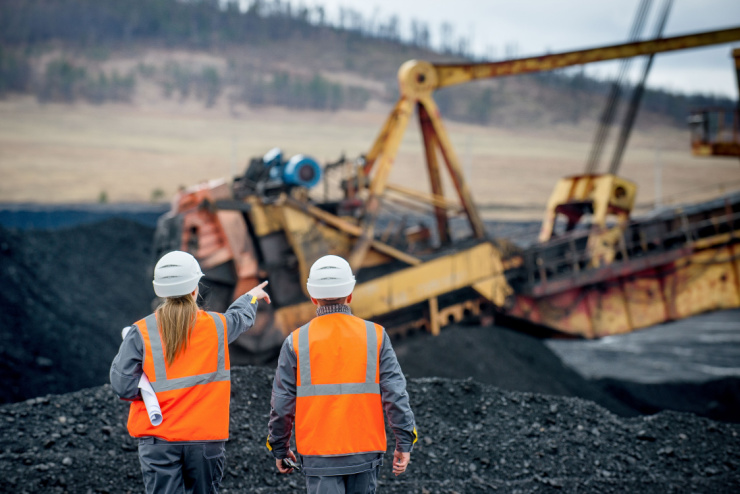
By Mark Agnor @ Shutterstock.com
You may be frustrated that Joe Biden is paying billions in student loans for American students whose degrees didn’t earn them enough to pay the loans back themselves. That’s the sad reality of attending an expensive school and majoring in something with no job prospects.
But one thing America does need is people who aren’t afraid to do the dirty jobs. Right now, America needs mining engineers. Mining engineers probably aren’t hoisting shovels and picks and climbing into mine shafts to actually dig, but they are a necessary part of America’s commodity markets, and not nearly enough are graduating from schools right now. Jim Constantopoulos, a Professor of Geology and the Director of Miles Mineral Museum at Eastern New Mexico University, reports at Real Clear Energy:
America prides itself on having the best system of higher education. However, a troubling shortage of mining engineers in the U.S. mocks the idea, which could be deadly for domestic mining and the economy. U.S. colleges and universities are engines of economic development. But enrollment in mining programs has dropped dramatically in recent years –and it is still declining. If this trend continues, fewer mining engineers will have the skills needed to build and manage mines in the U.S. that are needed to produce critically important minerals and metals for a green future.
Data compiled by the Society for Mining and Metallurgy shows that enrollment in mining engineering programs has fallen 45% since 2015, along with a steady drop in the number of U.S. schools with mining programs from a high of 25 in 1982 to 14 in 2023 with only six offering metallurgical mining. In fact, there were just 327 degrees awarded in 2020 in mining and mineral engineering at U.S. schools, a 39% net drop in the number of graduates in the U.S. since 2016. By contrast, China today has 44 mining schools graduating more than 5,000 students annually.
A grim reality sits behind the enrollment numbers. Despite U.S. government support and investment in domestic mining projects, a significant workforce gap threatens the ability of the U.S. to achieve mineral security. More than half of the domestic mining workforce — engineers and miners — will need to be retired and replaced by 2029 — roughly 200,000 people.
The U.S. needs to crank up its mining programs. Before the situation worsens, we must find ways to bolster the number of mining engineers educated in the US, Canada, and Australia, which also have a shortage of mining engineers.
However, the scale of the challenge is so vast that it cannot be met solely by colleges and universities. Governments must take the lead. A bipartisan coalition of Democrats and Republicans on the Senate Energy and Natural Resources Committee recently passed by a unanimous vote proposed legislation that would provide U.S. colleges and universities with $10 million a year for eight years to bolster the education and training of mining personnel. This multi-year strategy is essential to produce the next generation of domestic mining talent. Recruiting young men and women to pursue careers in mining engineering needs to start now because many engineers are reaching retirement age and must be replaced.
So, is it possible to produce more mining engineers and expand domestic mineral production? More than possible, it is essential. If U.S. production does not turn around soon, the problem of mineral scarcity and dependence on China for critical minerals like lithium and rare earths will only worsen, and the mining industry will stagnate. How better to promote growth than to stimulate investment in new engineers and miners?
What a joy it would be to see a new generation of mining engineers as intrigued by new mining technologies as they are by new batteries made from rare metals. Their seriousness would be driven not by the romantic love of mining but by a desire to achieve progress and direct it toward pragmatic goals.
Action Line: Will enough young Americans pursue becoming a mining engineer rather than a Tik Tok influencer, or radical progressive activist? The future will tell. If you know someone with the drive and intelligence to pursue a major like mining engineering, or something similar, give them a copy of my special report on How To Invest After Graduating College. They need to know how to best save their hard-earned dollars. If you need help with your retirement savings, let’s talk.
E.J. Smith - Your Survival Guy
Latest posts by E.J. Smith - Your Survival Guy (see all)
- How to Bring “1+1=3” into Your Life and More - May 3, 2024
- Prior Planning, with Help from the Concierge - May 3, 2024
- Tour Cunard’s QM2 - May 3, 2024
- Your Survival Guy’s Atlantic Crossing - May 2, 2024
- Is the Fed Campaigning for Biden? - May 2, 2024













